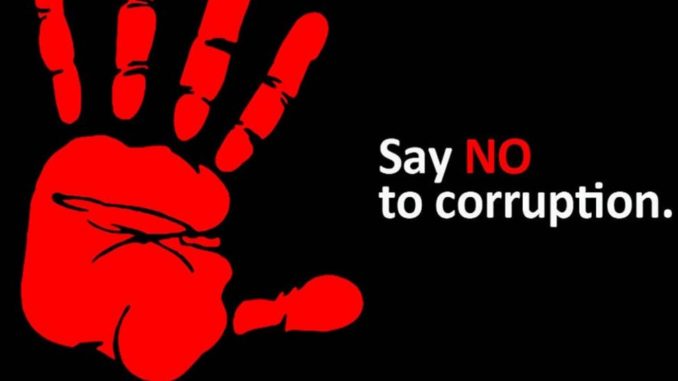
My dream is that we will be able to roll out this type of engagement to every Nigerian child. We want to create thousands of Naomi’s. Only if we catch them young, can we hope to change public attitudes towards corrupt behaviour. If we can change these attitudes, I strongly believe we have hope of properly tackling corruption in Nigeria.
‘Children should be allowed to be children. They should not be exposed to the cruel reality of how Nigeria consistently fails to function. Let that be an unwelcome surprise for adulthood’. That was pretty much the main criticism I faced when I wrote my first children’s book, Emeka’s Money: A Modern Parable About the Impact of Corruption that sets out to teach children about what corruption is, and the importance of standing up to it. Yet, the more I spoke with children in schools, the more I knew they were not being shielded from corruption. They are experiencing it every day. Whether it is when daddy “dashes” the policeman at the checkpoint, or when they journey on dangerous roads that had either not been built well or repaired for years. Kids are sitting in uncompleted classrooms, visiting dilapidated clinics, are forced to pay unofficial fees in supposedly free public schools and sometimes even coerced into under-age voting. Children in Nigeria experience corruption every day and are too often its main victims. Many of these corrupt activities they experience have become so normal they are routine. However, despite this daily experience, there is no framework for the children to interpret what they are seeing.
Is it good or is it bad? Is it just the way life works? More disturbing is also the attitude of young teenagers and adults. The expectation that you need to know someone to get a job or that you have to pay a bribe to achieve anything. It is hard to argue that the fault lies with them, it’s just the way our society has accepted all these practices as normal. The more I speak with children, the more I realise that if we want to break out of the corruption trap, we need to encourage a different attitude towards corruption from the younger generation. We need future leaders at all levels with integrity, who will stand-up to and speak-out against corruption. This needs to start happening in the children’s formative years.
My books focus on unpacking different aspects of corruption and how it impacts on daily life. Through Step Up Nigeria’s ‘Catch Them Young initiative’, we have been using my books Emeka’s Money and Halima’s Vote to teach anti-corruption education to children. Although we have not been doing this for long, we have had some short-term impact that has encouraged me to keep going on with this initiative. The most memorable for me was the story of a six-year-old girl in one of the schools we engaged. During the run up to elections, we had just read Halima’s Vote to the students in her school. Halima’s Vote teaches children about the negative impact of vote buying on public service delivery. It also teaches them about the power of voting. Some weeks after we engaged students on vote buying, a politician came with a big lorry full of food items to buy votes from residents in that area. The lorry was parked near the school gate. A little girl saw the lorry and food items being distributed. She panicked and ran to the headmistress’ office saying, “Mummy, mummy please tell the security man not to open the gate. Some people are here to buy our votes. Our votes are our power. We cannot sell.” The headmistress was shocked and asked, “where is this coming from?” The little girl replied, “Halima’s Vote. We were told this in Halima’s Vote.” The headmistress admitted she was going out to collect the food items but changed her mind after the little girl spoke to her. When I heard this story, my heart melted. This gave me more confidence that if we can sustain this initiative, then maybe we can create a new generation of young people with strong integrity, who are willing to act to stop corruption.
It encouraged me to keep writing and to keep doing the school engagements. In my most recent book, Tosin’s Story, a building collapses. Lives are lost. A young investigative journalist named Tosin unravels corruption and cover-ups, in a race against time to save more lives. Crucial to this is her courage and integrity and her willingness to speak out against corruption, even when those around her are either complicit in the corruption or content to turn a blind eye to it.
With thanks to backing from donors such as the United Nations Office on Drugs and Crime (UNODC) and MacArthur Foundation, Step Up Nigeria has already reached over 4,200 children with our books and class-room engagements over the last year, and over the next two years we will have reached more than 20,000. We are beginning to produce young anti-corruption champions who are speaking out against corruption. One of them is 13 years old Naomi Oloyede, who recently got the attention of the world as a result of the speech she gave at the Education for Justice conference organised by UNODC. Her speech was focused on the need to have a fair society and tackle corruption. My dream is that we will be able to roll out this type of engagement to every Nigerian child. We want to create thousands of Naomi’s. Only if we catch them young, can we hope to change public attitudes towards corrupt behaviour. If we can change these attitudes, I strongly believe we have hope of properly tackling corruption in Nigeria.
Onyinye Ough is executive director, Step Up For Social Development and Empowerment In Nigeria (Step Up Nigeria).
END

Be the first to comment